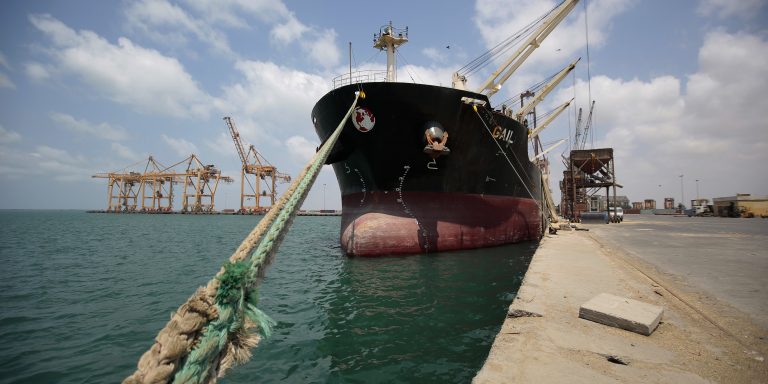INTELBRIEF
November 13, 2018
IntelBrief: War Before Peace: The Struggle to Control Hodeida

- On November 11, reports indicate that at least 149 Yemenis were killed in fighting for the port city of Hodeida.
- The toll includes 110 Houthi fighters, 32 pro-government fighters, and 7 civilians.
- The United Nations is warning again that the disruption or destruction of the vital port infrastructure will create a ‘catastrophic’ situation.
- The Saudi-UAE coalition is rushing to seize the port before peace talks, which are expected in December.
.
The ongoing suffering in Yemen is spiking again as fighters for the Saudi-UAE coalition battle Houthi rebels in the strategic port city of Hodeida. Since early November, the coalition has launched over 200 air strikes and have recently renewed a ground offensive as Riyadh and Abu Dhabi attempt to seize the port to be used as leverage before peace talks can commence, currently slated for December.The war in Yemen began, at least in the most recent phase, in March 2015 when Saudi and UAE jets began waging an aggressive air campaign to dislodge the Houthi rebels, who seized control of Yemen’s capital Sanaa, after protests toppled the Hadi government.
Throughout the conflict, the U.S. has provided sizable direct support for the coalition, including mid-air refueling, targeting intelligence, and some direct action by U.S. special operations forces along the Saudi-Yemeni border. The fighting, and the air strikes in particular, have killed thousands of civilians. The UN has accused both sides of war crimes and atrocities, also noting that the overwhelming majority of such crimes were the result of persistently indiscriminate coalition airstrikes. The air campaign has further degraded Yemen’s already dilapidated critical infrastructure. The scale of destruction is difficult to overstate in a country that has no ability to rebuild or generate its own revenue streams that could aid in reconstruction.
On November 9, the U.S. announced it would no longer provide refueling support to the coalition, while still continuing other significant support. The move comes amid pressure—which appears to have plateaued—exerted by the U.S. and other countries on Saudi Arabia over its state-sponsored murder of U.S. resident and exiled Saudi citizen Jamal Khashoggi, who was murdered on October 2 by a Saudi assassination team inside the Saudi consulate in Istanbul, Turkey. The murder generated a rare public criticism of the Saudis and a rebuke of Saudi foreign policy by the U.S., which has heretofore provided the kingdom with a blank check in terms of its campaign in Yemen—one Washington perceives to be a vital part of countering the spread of Iranian influence throughout the region.
When the Yemeni war started, Iranian support to the Houthis was negligible; but the Saudi campaign to roll back Iran’s influence in Yemen has been a self-fulfilling prophecy, producing the exact opposite intended effect of its goal. The Houthi rebels now possess Iranian missiles and other hardware, as well as military assistance and training provided by Iranian troops. The West has a very real concern of meaningful Iranian control over the waters off of Yemen’s coast, which are among the most important, as well as vulnerable, in terms of global oil traffic. That concern is a major reason why the U.S., as well as the U.K. and France, will continue to provide significant military support to Saudi Arabia and the U.A.E.
The battle for Hodeida has been unfolding in fits and starts for the past several months, with only gradual progress by the coalition. Still, the Houthis control the port. On November 9, the Houthis fired an anti-ship missile in to the waters of the Red Sea off of Hodeida. The missile failed to hit a ship, but the message was delivered nonetheless. What is unclear is if the peace talks will actually occur and, if they do, whether or not they can bring about an eventual cease-fire and a lasting resolution to the war. The U.S. and others do have meaningful leverage to pressure Saudi Arabia and the UAE to the negotiating table. Yet, that leverage is mitigated by the goal of using the fight in Yemen to help contain Iranian influence in the region. Yemeni civilians remain caught in the middle of the geopolitical maneuverings and their suffering is the only constant throughout what has been one of the most horrific wars of the past decade. The human suffering produced by this conflict will linger long after the fighting ends and a negotiated political settlement is reached.
.
For tailored research and analysis, please contact: info@thesoufancenter.org
[video width="960" height="540" mp4="https://thesoufancenter.org/wp-content/uploads/2018/11/IB-1113.mp4" poster="https://thesoufancenter.org/wp-content/uploads/2018/11/AP_18276423540795.jpg"][/video]